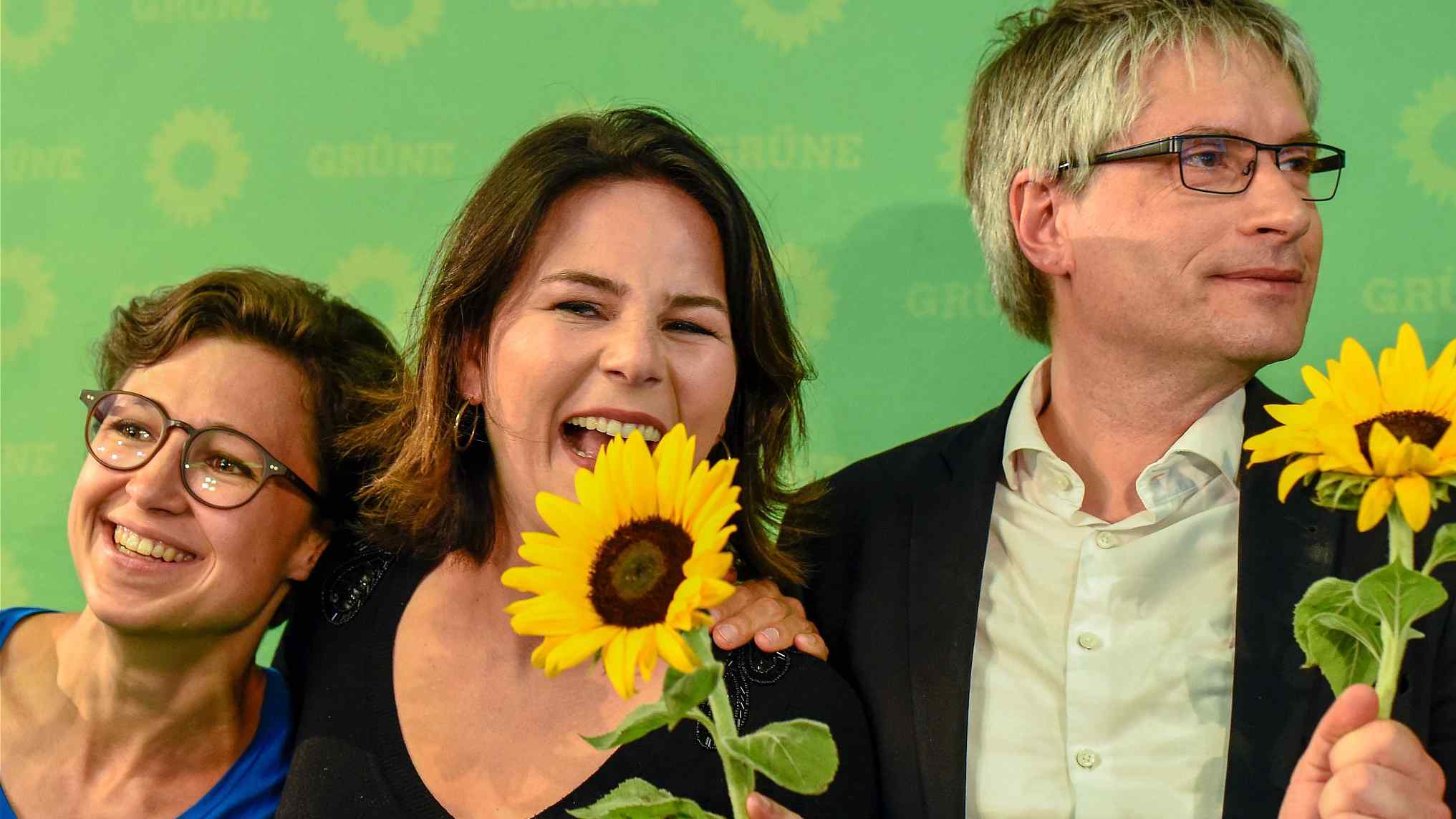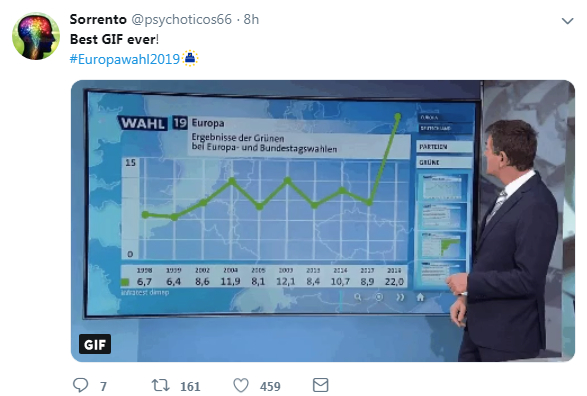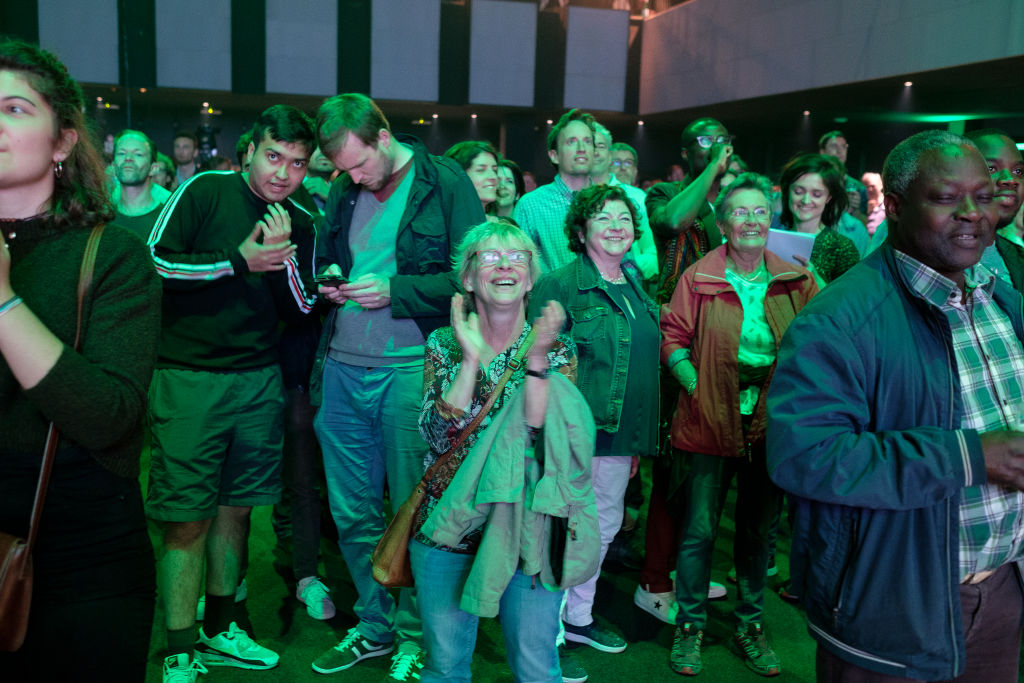
World
17:52, 27-May-2019
Green wave sweeps EU elections amid climate emergency fears
By Sim Sim Wissgott

Green parties scored big in this European election, potentially winning 20 or more seats in the next European Parliament, according to provisional results on Monday.
This comes on the back of massive climate change protests in recent weeks and months that continued even as voters headed to the polls this weekend.
With almost all votes counted in all 28 member states – mail ballots still needed to be tallied in some places – the Group of the Greens/European Free Alliance (EFA) looked set to have 69 seats in the new parliament, 19 more than before, according to official data.
Election forecaster Europe Elects predicted it could even win as many as 25 seats.
Wins in Germany and Finland, but also in more unlikely places like France, helped the Greens to their best showing ever.
In Germany, election results for Die Gruenen went literally off the charts – ARD television, clearly caught off guard, had a graphic showing the party's results disappearing off the grid, sparking amused reactions on social media.

German television ARD shows the Green party's result going off the charts. /CGTN screenshot of Twitter
German television ARD shows the Green party's result going off the charts. /CGTN screenshot of Twitter
With 21 percent of votes, Germany's Greens finished second behind Chancellor Angela Merkel's conservative CDU/CSU, and ahead of the Social Democrats and far-right Alternative for Germany.
In Finland, Ireland, Austria and Luxembourg, Green parties garnered between 14 and 19 percent of votes. In Belgium, Denmark, the Netherlands and the UK, they also made gains compared to 2014, although the result in the UK was in part linked to the pro-Remain campaign.
A bigger surprise was France's Europe-Écologie Les Verts (EELV) coming third with 13 percent of votes, behind the far-right Rassemblement National and President Emmanuel Macron's LREM.
"We are seeing a European Green wave," EELV top candidate Yannick Jadot told supporters on Sunday evening
From the streets to the ballot box
The Green parties' wins contrasted with massive setbacks for the two biggest blocs in the European parliament – the conservative EPP and the Social Democrats – who will no longer have a majority in the 751-seat assembly.
They also came amid a massive mobilization against climate change in recent months.
Schoolchildren and students, inspired by 16-year-old Swedish activist Greta Thunberg, have taken to the streets worldwide, warning about a looming climate emergency and demanding action from politicians.
On Friday, as the European elections were already underway, hundreds of thousands took part in new climate change protests around Europe and the world. These were still going on as the last voters headed to the polls on Sunday.

Supporters cheers at a post-election party for the Greens (Ecolo/Groen) in Brussels, Belgium, May 26, 2019. /Getty Images
Supporters cheers at a post-election party for the Greens (Ecolo/Groen) in Brussels, Belgium, May 26, 2019. /Getty Images
Speaking after first results were published in Germany, Annalena Baerbock, co-leader of Die Gruenen, acknowledged the impact these protests had in the election.
"We achieved this because many people took to the streets to demand action on climate change, while many young people in schools, in universities… were prepared to fight for climate action," she told supporters.
The environment has become one of the main political issues for young people and "that's a wonderful message for the future," Jadot also noted.
"I am very happy that young people took hold of this vote much more than anticipated," he added.
Parties and analysts had painted this election as crucial for the future of Europe, with far-right, populist and eurosceptic parties on the rise. Special efforts were made to boost participation and draw out the traditionally more liberal youth vote.
In Germany, 33 percent of voters under the age of 30 voted for the Green party, more than the next three parties put together, according to one analysis.
Turnout in the entire bloc was 50.5 percent, the highest it's been since 1994.

Yannick Jadot, top candidate of the Europe-Ecologie Les Verts (EELV) list, reacts after initial results are announced in Paris, France, May 26, 2019. /Getty Images
Yannick Jadot, top candidate of the Europe-Ecologie Les Verts (EELV) list, reacts after initial results are announced in Paris, France, May 26, 2019. /Getty Images
Greens as 'kingmakers'
The Green wave didn't sweep all of Europe. In countries like Hungary, Latvia and Croatia, parties linked to the Greens/EFA made little or no mark.
Still, as the fourth most important bloc in the new parliament, with a predicted 9.2 percent of seats – its largest contingent ever – some are already seeing the Greens as kingmakers.
With the two mainstream blocs falling short of 50 percent of seats in the new parliament, the Greens could prove crucial to securing a viable candidate for the post of European Commission president, the most influential job in the bloc.
(Cover picture: German Green party leader Annalena Baerbock (C) celebrates with EU candidates Hannah Neumann and Sven Giegold after exit polls are announced in Berlin, Germany, May 26, 2019. /Getty Images)

SITEMAP
Copyright © 2018 CGTN. Beijing ICP prepared NO.16065310-3
Copyright © 2018 CGTN. Beijing ICP prepared NO.16065310-3